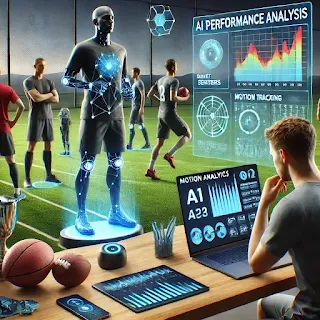Introduction
Artificial intelligence (AI) is transforming various industries, and sports is no exception. From player performance analysis to in-game strategy optimization, AI is playing an increasingly crucial role in modern athletics. By leveraging machine learning, computer vision, and data analytics, AI provides deeper insights into athletes' cognitive and physical metrics, ultimately enhancing training regimens and performance strategies.
This article explores how AI is being integrated into sports performance analysis, the technologies behind it, and its impact on athletes and teams.
The Growing Role of AI in Sports Performance
1. AI-Powered Performance Tracking and Analysis
AI is being used to collect and analyze vast amounts of player data in real time. Key applications include:
Wearable Sensors: Devices that track heart rate, speed, acceleration, and other physical metrics.
Computer Vision Systems: AI-powered cameras analyze movement patterns, biomechanics, and positioning.
Big Data Analytics: AI processes massive datasets to provide insights into player efficiency, fatigue levels, and injury risks.
2. Cognitive Function Assessment with AI
AI is increasingly used to assess and enhance an athlete’s cognitive abilities, including:
Reaction Time Analysis: AI monitors how quickly players respond to stimuli.
Decision-Making Patterns: Machine learning algorithms evaluate past performances to predict and improve decision-making.
Mental Fatigue Detection: AI can track brain activity and stress levels to optimize training schedules.
AI Technologies Transforming Sports Analysis
1. Machine Learning for Performance Prediction
Machine learning models can predict player performance based on historical data. Teams use AI to:
Identify key performance trends.
Assess an athlete’s peak condition and suggest optimal rest periods.
Develop personalized training programs based on individual strengths and weaknesses.
2. Computer Vision for Motion and Biomechanics Analysis
Computer vision applications in sports include:
Player Motion Tracking: AI analyzes movement patterns to refine techniques and improve form.
Injury Prevention: AI detects potential injury risks by identifying irregular movement patterns.
Referee Assistance: AI-powered camera systems help officials make accurate in-game decisions.
3. AI-Driven Tactical and Strategic Insights
Coaches and analysts use AI to develop game strategies based on:
Opponent analysis and weakness identification.
Real-time adjustments during games.
Simulating various match scenarios using predictive AI models.
The Impact of AI on Training and Game Strategies
1. Personalized Training Regimens
AI customizes training programs by analyzing an athlete’s unique physical and cognitive attributes. This enables:
More efficient workouts tailored to specific goals.
Injury prevention through optimized training loads.
Recovery tracking for faster rehabilitation.
2. Enhancing Team Coordination and Communication
AI helps teams improve coordination by analyzing:
Passing networks and movement synchronization.
Team formations and defensive setups.
Communication patterns to enhance teamwork efficiency.
3. Real-Time Game Adjustments
AI-powered analytics allow coaches to make data-driven decisions in real time. This includes:
Substitutions based on player fatigue levels.
Tactical changes in response to opponents’ strategies.
Optimizing game pace and style of play.
Challenges and Ethical Considerations
1. Data Privacy and Security
With AI collecting vast amounts of personal data, there are concerns over:
How athlete data is stored and used.
Potential misuse of biometric information.
Ensuring compliance with data protection laws.
2. Over-Reliance on AI vs. Human Intuition
While AI enhances decision-making, sports still require human intuition and experience. Balancing AI insights with traditional coaching methods is essential.
3. Cost and Accessibility
Advanced AI systems can be expensive, limiting access for smaller teams and organizations. Wider adoption may require:
More affordable AI solutions for grassroots sports.
Government or private funding initiatives to support AI integration.
The Evolution of AI in Sports Performance Evaluation
1. AI-Powered Virtual Coaching
Future AI systems could serve as virtual coaches, providing real-time feedback and personalized drills for athletes at all levels.
2. Advanced AI Simulations for Game Strategy
AI-driven simulations will continue to evolve, allowing teams to test various strategies in virtual environments before implementing them in real matches.
3. Integration of AI with Augmented Reality (AR) and Virtual Reality (VR)
Combining AI with AR/VR could create immersive training experiences, helping athletes refine skills in simulated game environments.
Conclusion
AI is revolutionizing sports performance analysis by providing unprecedented insights into player training, cognitive functions, and game strategies. As technology advances, AI will continue to enhance how athletes train, compete, and recover. However, balancing AI’s capabilities with ethical considerations and human expertise is crucial for maximizing its benefits. With continued innovation and responsible implementation, AI will play a defining role in shaping the future of sports.
Courtesy: Internet
No comments:
Post a Comment